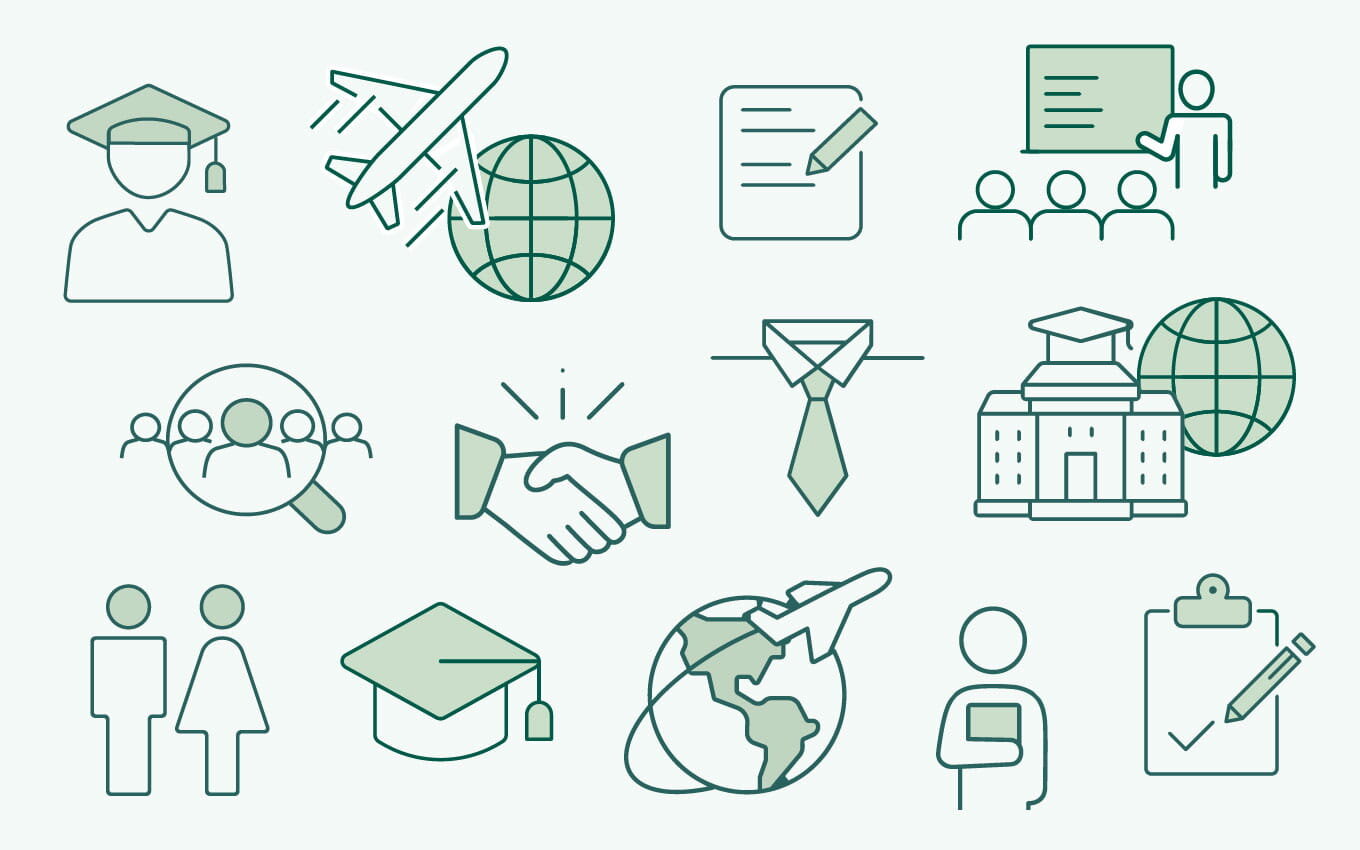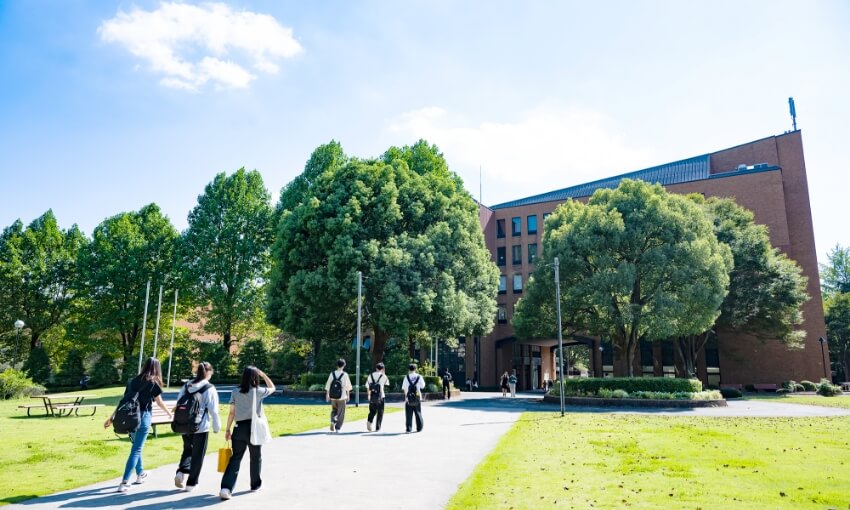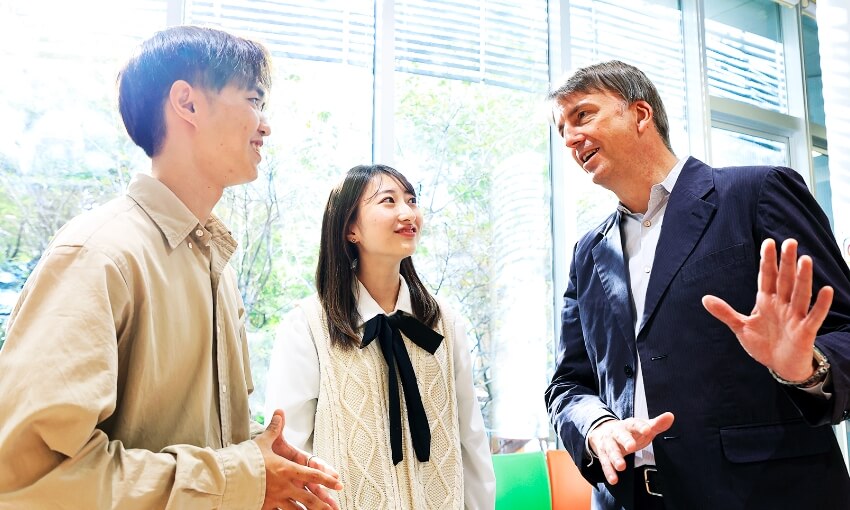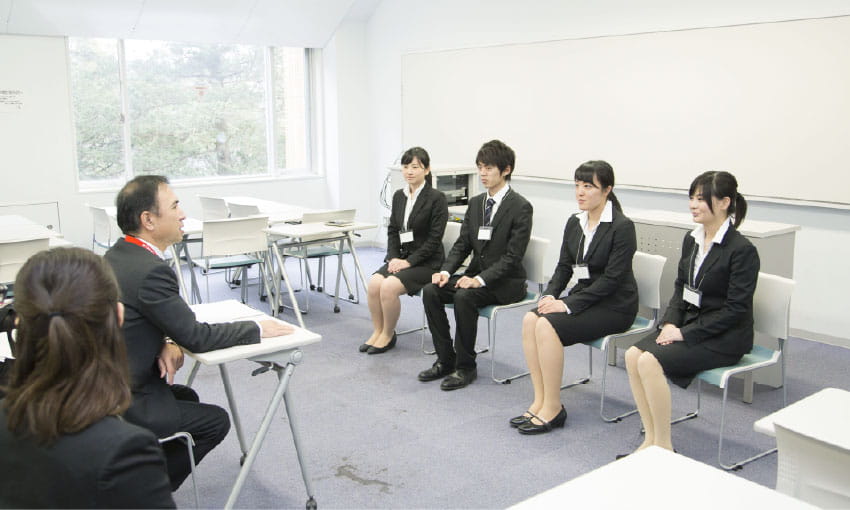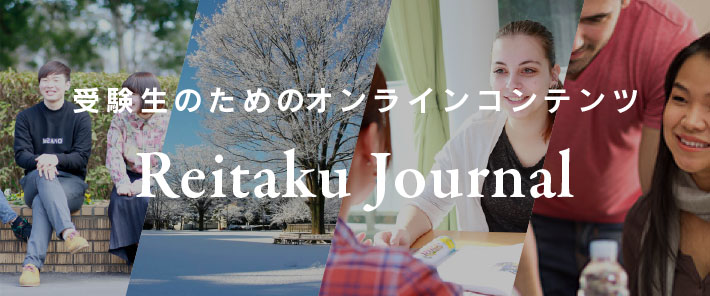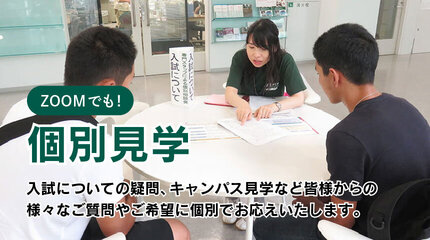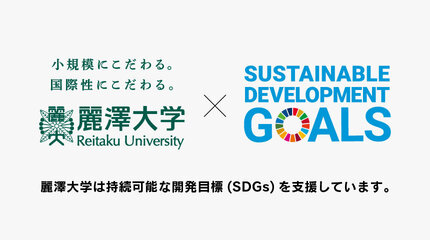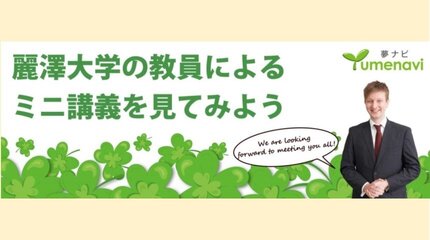You can view campus information in the form of data.
About the UniversityThe Reitaku Standard
The Reitaku Standard (Basic Education) and
high-quality specialized education
cultivating
"Qualified global talent"
The Reitaku Standard is a university-wide basic education that equips students with the ability to continue learning for life in order to adapt to the changing times. Through active learning, students proactively engage with academic subjects, while acquiring the foundation for specialized education, an understanding of diversity, and the culture and thinking that are characteristic of Reitaku University students, through integrated and interdisciplinary learning across the humanities and sciences.
Global Education
Language, intercultural understanding, studying abroad
By experiencing life in a foreign country through language study or studying abroad, you will become aware of the diversity of the world and build a foundation for accepting and understanding different cultures. This will help you reexamine your own identity and become more deeply aware of your own country and yourself.
Learn about diverse values and different cultures,
Cultivating independence that contributes to society
Our university has a full range of study abroad programs, as well as an environment for learning languages and the world, and cultivating the ability to understand different cultures, such as iFloor, where you can experience practical English learning activities with students and faculty from around the world, Conversation Partnership, which helps international students adapt to life in Japan, and COIL, an online international collaborative learning program. Students can take on programs in stages according to their individual interests and levels, and by connecting with people from various cultures and backgrounds, they can gain experience in "accepting diversity," and develop the independence that society and companies require.

English Education CEC (Reitaku Center for English Communication)
Thorough instruction by a group of English education specialists
Learning environment iFloor
A multi-functional self-access learning facility for foreign languages that condenses the world
Study Abroad / Online Study Abroad
Connect with the world while in Japan
Study Abroad / Real Study Abroad
A fulfilling study abroad experience at our overseas partner and exchange schools
Collaborative Online International Learning (COIL)
Online collaborative learning between students from two countries with different linguistic and cultural backgrounds
Classes in English UNIP
This is a program where you study together with exchange students from overseas partner schools as preparation for studying abroad. A wide variety of subjects are available, including economics and management, intercultural communication, Japanese culture, and cultural anthropology. The language and textbooks are in English. Depending on the subject, a TOEIC score of 450-500 or 500 or above is required to take the course. This is a program that truly gives you a simulated experience of studying abroad.
Exchange activities Conversation Partnership
Japanese partners support international students to adapt to life in Japan
Moral Education
SDGs, social engagement, and dialogue with people
Society is home to a diverse range of people with different values and cultural backgrounds, and in order to coexist with them, we need the ability to understand ourselves and others, to act independently, and to connect with others. Each individual will acquire the ability to make better decisions.
Learning as a compass for the heart
Since its founding, Reitaku University has upheld the educational philosophy of "unity of knowledge and virtue" and has placed emphasis on moral education. Morality refers to the feelings and actions of each of us who are considerate of others so that we, others, society, and the people of the world can all be happy. It can also be said to be a compass for the heart that allows us to make better decisions.
The world is now being challenged by issues such as the Sustainable Development Goals (SDGs) and Corporate Social Responsibility (CSR), and we are being asked to think ethically about what we can do for people, society, the world, and the planet, rather than just prioritizing our own interests. Through moral education, we foster the attitude necessary for dignified global talent.
What is the necessary attitude for dialogue with people?
Differences are natural. Not just in language,
It is important to study social and cultural backgrounds in depth
In order for people with different cultures and values to interact and accomplish something, it is necessary to have the communication skills to listen carefully to what the other person has to say, treat all opinions fairly, and have a heart that respects others.
"SDGs and Morality" (All Faculties)
Through lectures and discussions on the theme of "SDGs," students will deepen their understanding of the founding spirit of Reitaku University. They will also participate in the SDGs forum held on campus to deepen their individual understanding of the SDGs. Through these activities, students will also develop the ability to take the initiative, listen carefully to what others have to say, and make decisions together.

To demonstrate leadership
What you need
Without trust and building relationships with those around us,
Collaboration is not possible
In order to continue growing as a person, we need to tackle everyday problems close to us and find solutions that are a win-win for ourselves, others, and third parties. In particular, leaders who bring groups together are required to have a broad perspective and flexible imagination. At our school, we develop leadership skills by providing opportunities to discuss specific issues and consider them from multiple angles.
"Exploring Morality in a New Era" (All Faculties)
By applying theories of morality and views on humanity, students will think about the issues of modern society and problems that students are likely to face, and explore ways to solve them. Guest speakers will be invited on various themes, such as "parents and children," "marriage," "friendship and romance," and "leadership," and after listening to their lectures, students will have a series of discussions.
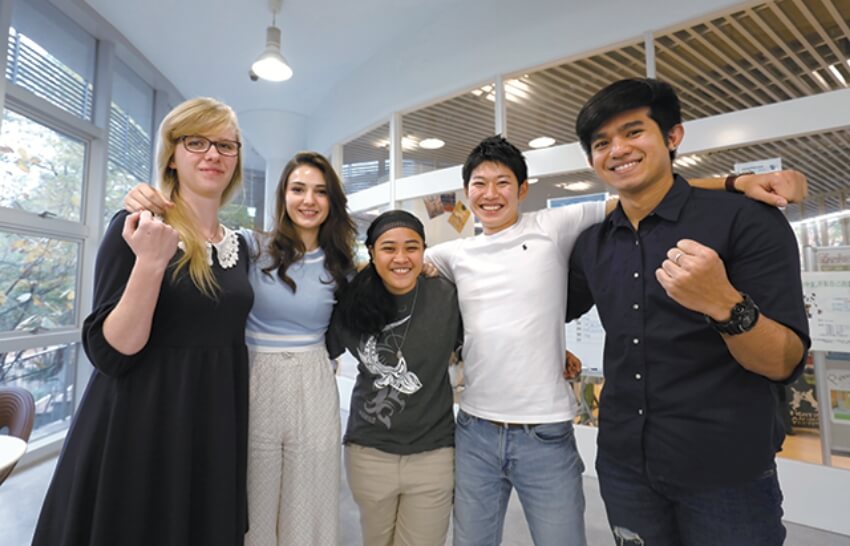
Is there a close relationship between economic activity and morality?
Pursuing profits alone will not achieve sustainable development or contribution to society.
Corporate management cannot exist without making profits. However, we believe that "a company cannot achieve sustainable development unless the company, its employees, and society are all happy," and we learn from examples of actual companies, such as "management that values human development" and "management that emphasizes social contribution," to develop a perspective that allows us to discern companies and their managers.
"Management and Morality A & B" (Faculty of Foreign Studies, Faculty of Global Studies, Faculty of Economics and Business Administration)
Based on the idea of "unity of Moral and Economy" (integration of morality and economics) advocated by our founder, Chikuro Hiroike (Doctor of Law), students learn the basic ideas and issues of corporate management. Special lectures by managers who actually practice moral management are valuable and unique to our university, and are highly popular among students.
*Students in Faculty of Business Administration can take this course as a specialized subject.

Data Science Education
IoT, AI (Artificial Intelligence), Big Data, Algorithms, Qualifications
Data science is a skill that will be necessary in the future society, regardless of whether you are in the humanities or sciences. Knowing that there is an approach called data science to business problems and using the global language of data as a weapon will also be useful for your future career development.
Regardless of whether you are in the humanities or sciences,
Data Science Education
Data is a global language, even more so than English. Regardless of whether you are in the humanities or sciences, if you understand what data science is, it is like having a weapon, just like English.
If you have the ability to shape data, you can pursue a career that suits you in any field in the world. Experiencing data science at university will help expand your future possibilities.
What is Data Science Education at Reitaku University?
At Reitaku University, students from all faculties are offered a "Data Science Education (Data Science Program)" in which they learn literacy in AI and data science in addition to studying their specialized fields. By acquiring literacy-level knowledge and understanding and utilizing the mechanisms of data science used in the world, students can use this knowledge to solve various problems in their work. For students who wish to study AI and data science in more depth, advanced-level courses are also available.
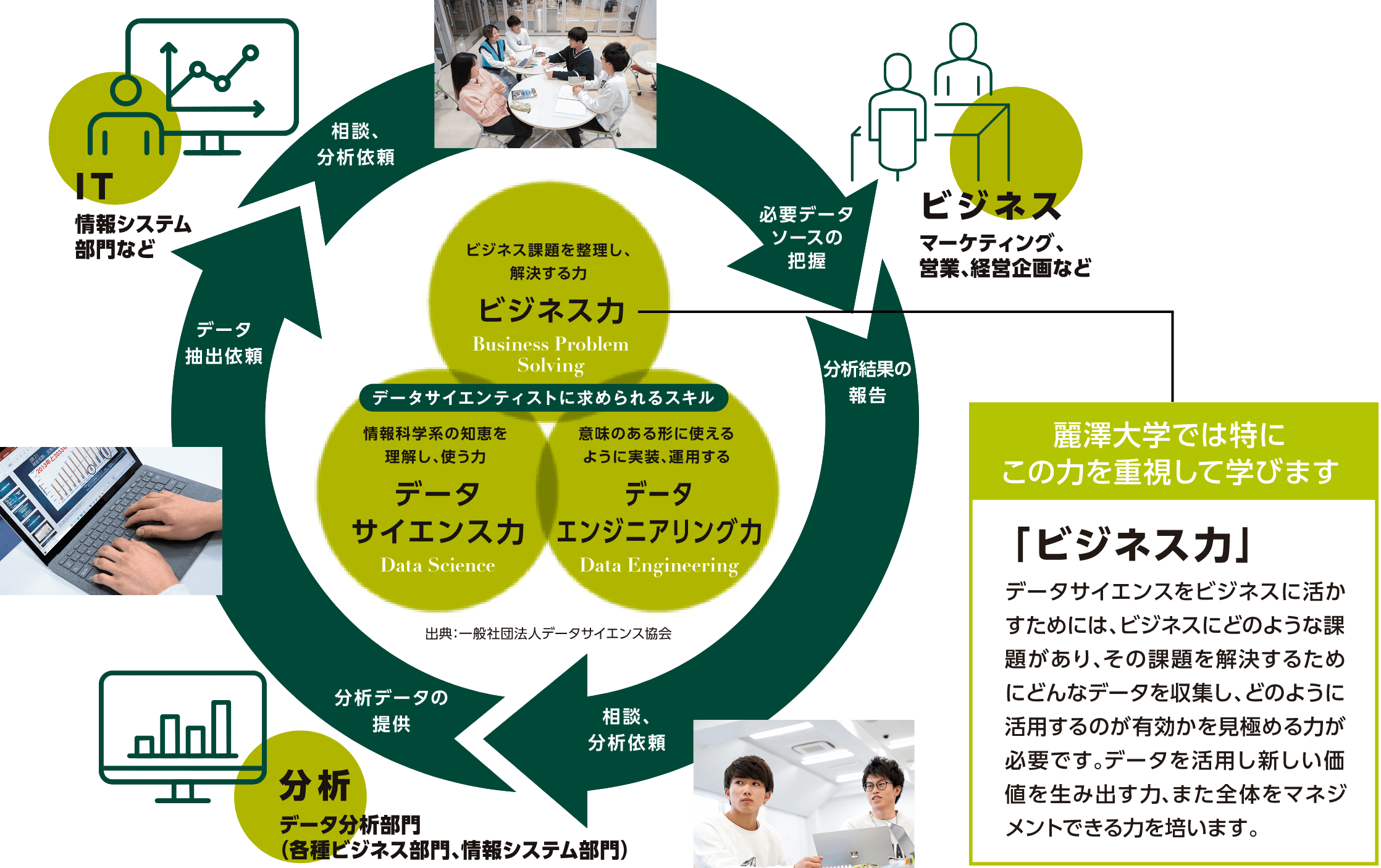
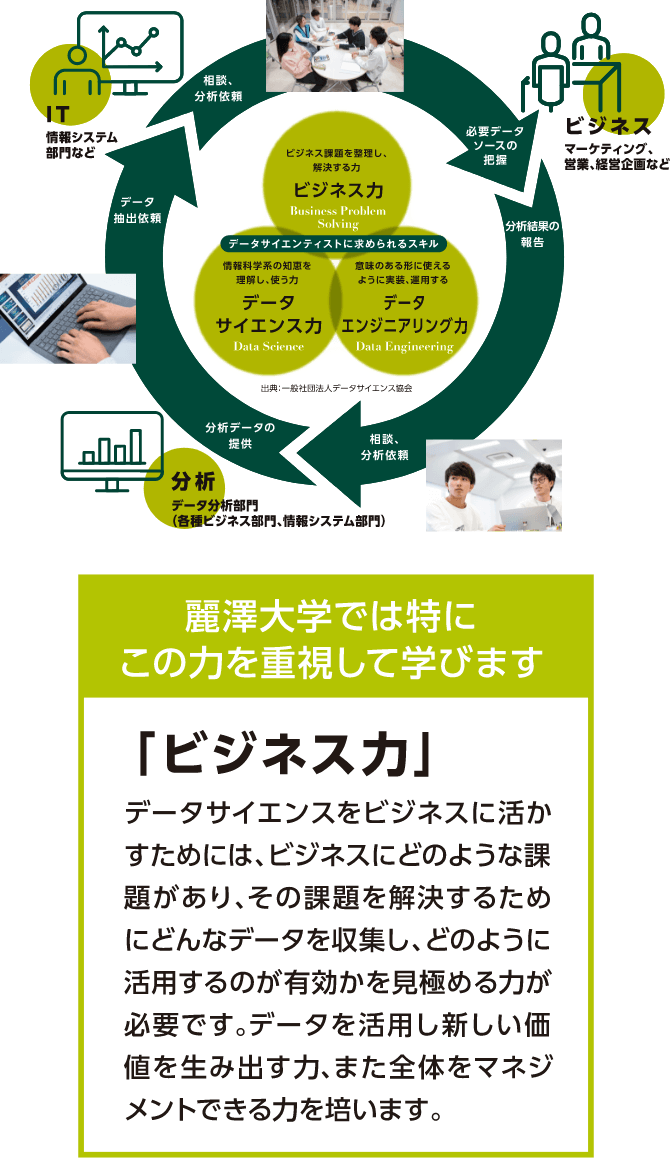
Career education
Self-understanding, career ownership, and envisioning the future
In today's rapidly changing society, it is necessary to have the ability to see things from a long-term perspective, without being limited by immediate information. By connecting the knowledge and experience gained at university with information gathering and self-understanding gained through career education, students will acquire the ability to carve out their own future.
Towards human resources who can survive in uncertain times
Although university life is only four years, life after graduating from university will continue for decades. Society is now changing at an unprecedented speed due to globalization, population decline, and the rapid development of data science. Therefore, Reitaku University 's career education emphasizes cultivating a "long-term perspective" in students. Taking advantage of the benefits of small-group education, the career center staff will look after each student and work to change their mindset and develop their talents through both career subjects and job-hunting support. The goal is to produce "Reitaku-style street smart" talent who can understand other people's feelings and have the skills and humanity to survive in any environment in the future.
Five perspectives to pave the way for your future
In order to plan your career from a long-term perspective, here are five points to consider when thinking about how you should lead your student life at Reitaku University.
Get your student life off to a positive start
From the freshman orientation, Reitaku University has a career guidance session where students think about their future. In the class "Reitaku Spirit and Career", students deepen their understanding of themselves and the university and think about their career development.
Many challenges in your student days
We encourage students to try a variety of different endeavors, including PBL (problem-solving learning) in class, studying abroad, extracurricular activities, internships, volunteer work, and part-time jobs, rather than just one.
Learning from the stories of our seniors
Senior students who are active both in Japan and abroad rush to help, saying, "We are always ready to help students of Reiwa University."
In particular, the achievements of our graduates who share the same Reitaku spirit will be a great encouragement for all of you who take on challenges.
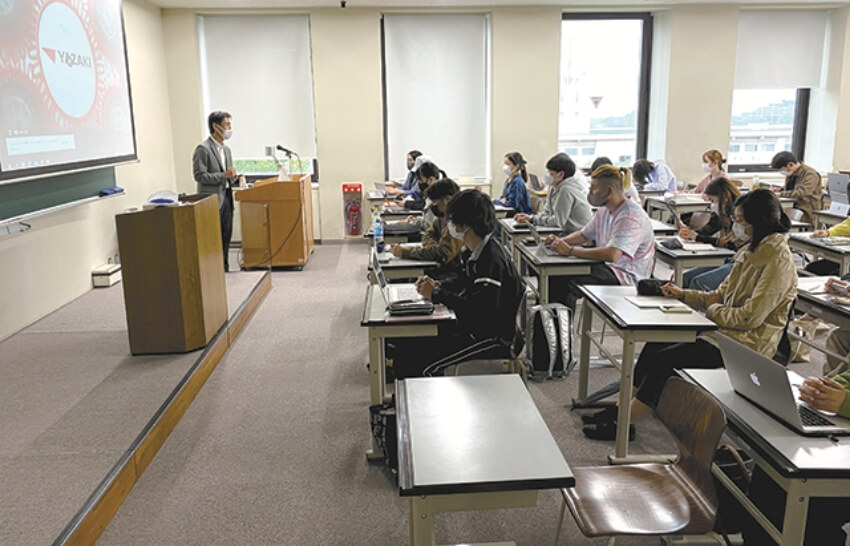
Gain the ability to predict trends in society and changes in the industrial structure
In each career subject, Senior Lecturer are invited from specialized institutions to learn about the changing future, such as Society 5.0. In addition, industry seminars are held by leading companies in each industry in the "Career Development Research" class. By holding these seminars as classes, students are able to broaden their horizons by gaining a broader understanding of the industrial structure of the world, in addition to stimulating their own interests. Career Center staff also visit companies throughout the year to get a real sense of what companies are like and build strong connections.
Cultivate a mindset of continuing to learn
There are many ways to learn, such as reading books, learning from the internet or videos, watching the news, etc. We also provide hints for continuing to learn on your own in our career subjects classes.









